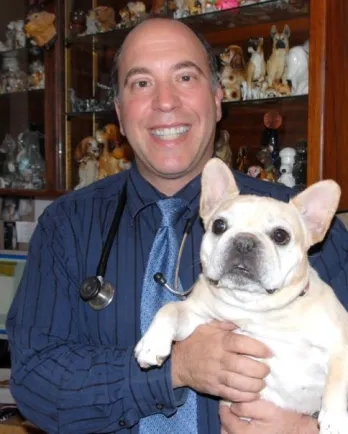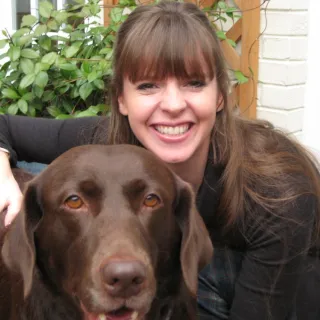Veterinary Medicine and Animal Welfare: An Interview with Dr. Dean Vicksman, DVM
Dr. Dean Vicksman, DVM is a practicing veterinarian at Evans East Animal Hospital in Denver, Colorado. He is also a strong advocate for animals in need. In addition to being a member of Grey Muzzle's Advisory Board, he is a past Chair of the Board at the Dumb Friends League and current Board Chair at PetAid Colorado, an organization that serves as a healthcare safety net for underprivileged and at-risk pets. A Certified Veterinary Journalist, he is also a guest expert on ABC Channel 7 and FOX31 News in Denver and a member of the Veterinary News Network.
We asked Dr. Vicksman how he has combined his veterinary and animal welfare work, and to offer his advice on the special health and care needs of senior dogs.
How did you decide to go into veterinary medicine, and what has inspired your passion for animal welfare?
If you ask my family or any of my friends who have known me since I was a child, they will all tell you I have always wanted to be a veterinarian. It was in high school, when I volunteered at the Dumb Friends League in Denver, that my passion for animal welfare began. I have always wanted to help homeless and underserved animals.
When I graduated from veterinary school, I did my internship at Angell Memorial Animal Hospital, which is a subsidiary of the Massachusetts Society for the Prevention of Cruelty to Animals. When I finished there, the opportunity to co-own my own animal hospital arose, so my life took a diversion from animal welfare, but I knew I couldn’t stay away. In 2002 the opportunity to be on the Board of Directors at the Dumb Friends League emerged, and so again I found myself back in animal welfare. Today I have the best of both worlds. I can help animals in a private practice setting and I am also Board Chair of PetAid Colorado, our animal hospital for the underserved.
Both your interest in veterinary medicine and your concern for animal welfare began early. What did volunteering at the Dumb Friends League in high school teach you? How important is it that young people get involved in animal welfare?
As I said, since I was young, I always wanted to be a veterinarian. I felt volunteering at the Dumb Friends League would provide me the opportunity to see if this was truly the career path I wanted to choose. Little did I know, before going into it, how impactful it would be on my life. In addition to solidifying my desire to be a veterinarian, it opened my mind to the world of animal welfare.
I was at a very impressionable age then, as are most current Millennials. I am a huge proponent of getting Millennials involved in animal welfare. They are our future and hold the keys to our success, both philosophically and philanthropically. Animal welfare issues will always be with us, and if we don’t get young people involved, philosophically we will become old and stagnant. Young minds keep us fresh and on the cutting edge. Also, most individuals my age and older have already established their philanthropic interests. Young people, although typically not in a position to be philanthropic, will be, and are the key to our future.
You are also on the Board of PetAid Colorado. What is its approach to animal welfare?
At first glance most people don’t see the link between PetAid Colorado and the animal welfare community, but the two intertwine beautifully. We are the healthcare safety net for pets.
When an owned and loved animal becomes ill and the owner cannot afford to take care of that pet, for whatever reason, we are there to help. If we were not there, many of those animals–for which a human-animal bond already exists–would end up back in the animal welfare community. That is detrimental to everyone. PetAid Colorado reduces hardships for those owners who potentially would have to relinquish a bonded animal to an already overwhelmed system, and helps prevent undue stress on the animal welfare community by supporting pets already in loving homes. It’s a win win situation for everyone.
In addition to your animal welfare work, you are an advocate for senior dogs as a veterinarian. What do you think has changed the most during your career in terms of the attitude toward or the treatment of older dogs?
People are more willing to treat and manage chronic conditions in older pets. I feel fortunate to have practiced during an interesting time in veterinary medicine. During my career not only has the status of pets risen to become valued members of our families, but at the same time, the diagnostic and treatment options available to us to treat those pets has equally expanded. We are doing diagnostics and treatments today that were unthinkable 30 years ago. And equally as important, we are providing a good quality of life for those senior pets.
But as you know, we have a long way to go for the unowned and underprivileged senior pets. I feel fortunate to be associated with organizations like The Grey Muzzle Organization, the Dumb Friends League, and PetAid Colorado who understand the importance of that bond with senior pets and work tirelessly to place or keep placed senior pets.
Given the new diagnostics and treatments now available, what do you recommend dog owners ask their vets or have checked when their dogs become seniors?
When a dog becomes a senior depends on the size of the dog. For small breed dogs, we consider them to be senior at 8 to 10 years of age, whereas giant breeds may be senior at 6 to 8 years of age. As for what pet owners should ask or have checked, I believe that annual physical exams are critical. You and I can express our concerns to our doctors, our pets cannot. Also, as many of us know, our pets can conceal their illnesses until they are very sick. By getting that annual or semiannual physical exam, we can hopefully identify problems before it is too late.
Finally, it is estimated that 20% of pets over 8 years of age will have normal physical exams and yet have abnormalities on their blood tests. I believe that senior pets should have annual blood tests. I myself get blood tested every year.
Is there an ailment you see in older dogs that you think could be more preventable with the right care by dog owners?
Probably the most preventable yet overlooked aspect of pet care is oral health. Dental disease is extremely prevalent in our older population of pets. Think about us, we brush our teeth daily and visit the dentist several times a year, all to keep our teeth and bodies healthy. Dental disease can have serious consequences to our overall health, and it is the same for our pets. I recommend that all pet owners discuss with their veterinarian proper oral health care for their pets.
You can find out more about Dr. Dean Vicksman, and all of Grey Muzzle's Advisory Board members, here. The Grey Muzzle Organization improves the lives of at-risk senior dogs by providing funding and resources to animal shelters, rescue organizations, sanctuaries, and other nonprofit groups nationwide.
Interviewed by K.E. Magoon, Grey Matters Blog Manager and Editor.



